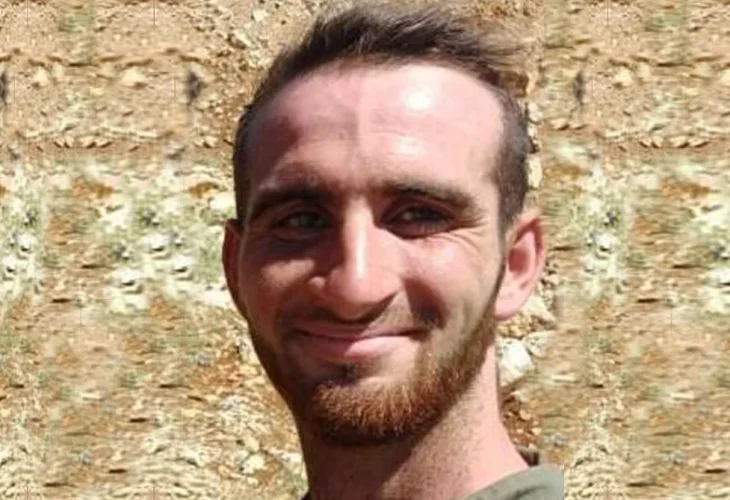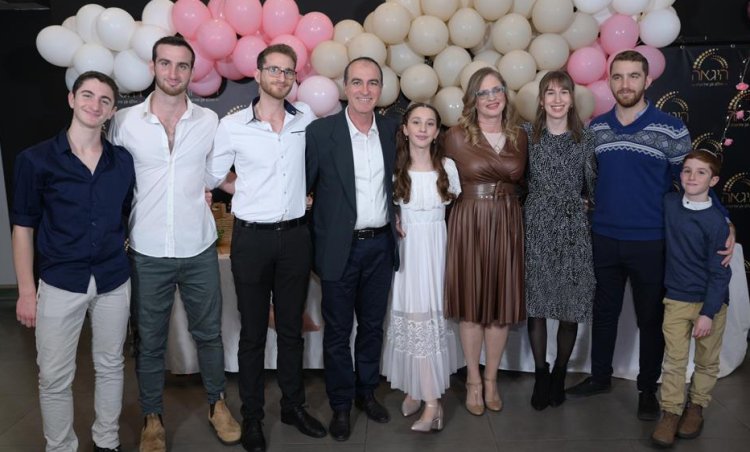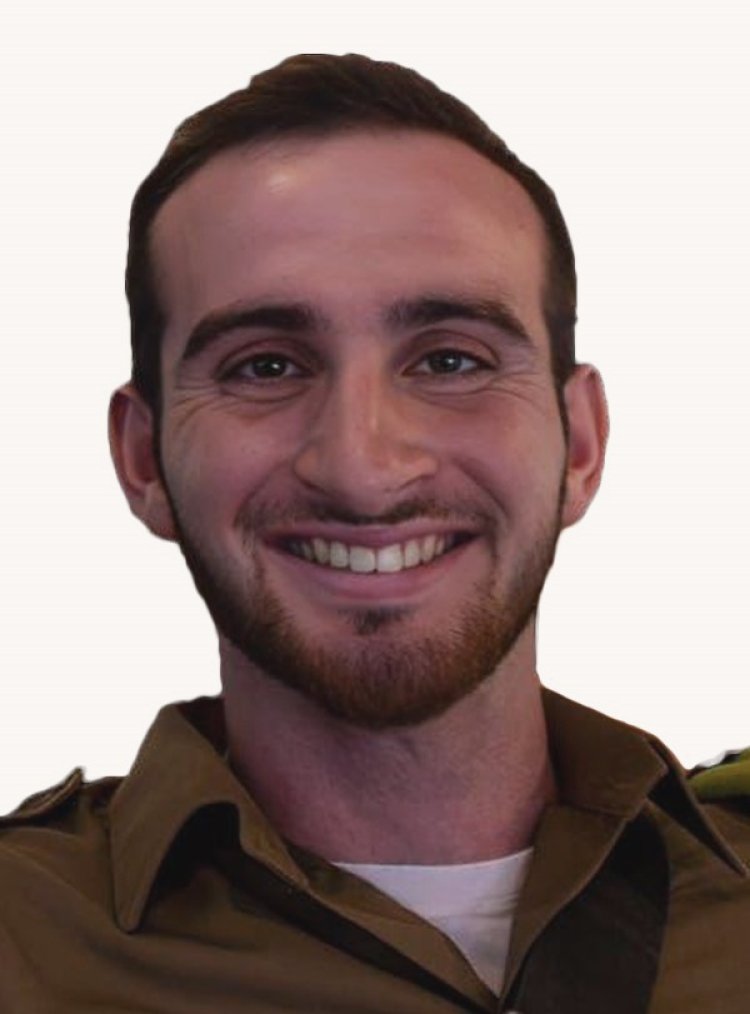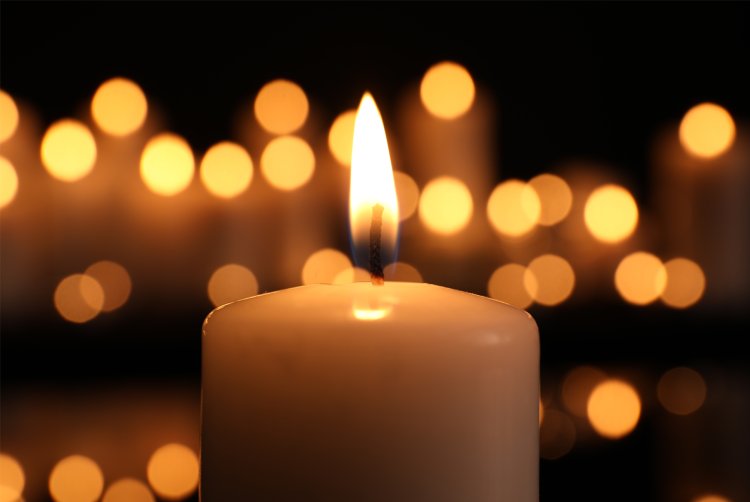The Unimaginable Courage of Tomer Mizrahi
After being critically injured, Tomer Mizrahi continued to fight valiantly until his last breath, playing a crucial role in saving a community. His mother Sarit shares his remarkable story.
 Tomer Mizrahi, z"l
Tomer Mizrahi, z"lOn Simchat Torah, 5784, Sarit Mizrahi, a resident of the Hoshaya settlement, arrived at the synagogue for the morning's celebrations, as rumors began to spread about chaos in the south and declarations of war. At that moment, no one knew the details of what was happening, especially in Hoshaya, located in the Jezreel Valley, where no alarms were heard.
"Yet," Sarit says, "I burst into tears. At that time, two of my six children were in the army - Matan, who was in charge of a communications battalion in the valley, and Tomer, who was stationed at the Sufa post. Even then, I felt that something wasn't right with Tomer, and indeed, for three days we were unable to contact him. I wandered around with a terrible feeling, hearing from all directions: 'He's probably in combat and can't call,' but in my heart, I knew it wasn't like that. The feeling was very strong, I knew something was wrong."
 Tomer with his family
Tomer with his familyUnimaginable Bravery
"My last conversation with Tomer was on the eve of the holiday," Sarit shares, "a brief call, as I often have with all my children who aren't home on Shabbat or holidays. We agreed to talk again after the holiday ended, and everything seemed normal. I had no clue that we were about to go through three days of complete uncertainty, which is the worst thing for a parent. After three days, we received the devastating news at our door."
Sarit notes that at the time, they weren't given any details about how Tomer was killed. "The first to provide us with fragments of information was our eldest son, who was also in the army back then and knew some of Tomer's team. He heard the story in general terms, and gradually, we began uncovering more pieces of information. This is how we gathered testimony after testimony, linked evidence to evidence, and began understanding what had happened there."
So what really happened?
Sarit emphasizes that Tomer chose to be the communications officer for the company commander in the Nahal Brigade unit, which meant he was always by the commander's side, serving as his right hand. "We didn't know, but on that Shabbat, most of the fighters were on holiday leave, and Tomer remained at the post with a few soldiers and their commander, Roy Chapal. Interestingly, several weeks later we received a photo of them from the evening before the holiday, showing Tomer's command team posing on the fence, but Tomer wasn't in the picture. This intrigued us, and when we tried to find out where Tomer was, we learned that on the eve of Simchat Torah, he had attended the holiday prayer in the settlement, brought along another soldier, and significantly participated in the celebrations. He promised to return the next day for the morning celebrations but, unfortunately, didn't make it. Personally, I was glad that on his last day, he had a festive atmosphere."
"From the information we received, we also understood that the next day they woke up at five-thirty for 'Dawn Alert,' as they were responsible for the southernmost front of the envelope. Tomer set off in a 'David' armored vehicle, which is bulletproof but not rocket-proof, to patrol the fence. Besides him, the vehicle carried three more people: the commander, Roy, the communications officer, Tomer, and the driver, Ronny.
"By six-thirty, they identified a heavy barrage of rockets, which came as a complete surprise. A few minutes later, reports came in from lookout soldiers in the Kerem Shalom area, stating they saw infiltrations of terrorists, but their prediction system was hit, and the observations were disrupted. At this point, Tomer and his friends realized it was something bigger than a routine rocket attack, and they began moving across the sector. Initially, they drove to Nir Yitzhak, where no terrorists had arrived yet, and when they returned, they spotted motorcycles and pickups carrying about eighty terrorists who had breached the Sufa area. They were only three fighters, but they managed to do a lot — the commander, with Tomer's help, issued instructions over the radio to the few soldiers at the post at that time. This enabled them to advance a single tank they had and bring it closer to the fence. The commander and Tomer also deployed an 'Akzriyit' armored vehicle with eight soldiers to Kibbutz Holit, but it was ambushed and didn't make it. The small command team of Tomer, Roy, and the driver decided to try to rescue them, and indeed, thanks to their actions, all eight soldiers survived and are alive today. Additionally, they had only one missile, but they managed to throw it at a whole pickup of terrorists, eliminating all of them. Needless to say, the potential for murder by each of the eliminated terrorists was significant.
"They did a lot of actions until they received a call for help from a force in the Dangur memorial area, where they were besieged within a pillbox surrounded by terrorists. They drove to assist that force, where they were ambushed by terrorists who launched an RPG missile at the vehicle, hitting exactly where Tomer was sitting behind.
"Personally," Sarit says, "I didn't go to see the vehicle because I felt I couldn't handle it. But my husband wanted to see it, and he told me afterward that a huge hole was opened up right where Tomer was sitting, which indicates that Tomer's injury was likely severe, affecting his internal organs.
"But here begins the unbelievable story that seems like a kind of inexplicable miracle. Because after Tomer was so critically injured, he managed to get out of the vehicle and fight the terrorists surrounding them. In this battle, the commander was killed by sniper fire, and the driver, Ronny, who tried to help the commander, was shot in the leg by the same terrorist. Tomer, with his last strength, covered the driver, so he could apply a tourniquet. Unfortunately, a different team that arrived about 20 minutes later found Tomer and Roy no longer alive."
 Tomer Mizrahi, z
Tomer Mizrahi, zMinutes That Saved Lives
When asked what life is like after such a heavy loss, Sarit answers with a story: "One person who always manages to ground me is an eleven-year-old named Elad, the youngest in our family. Last year, after returning from Holocaust Remembrance Day at school, he said to me: 'Mom, everyone who was in the Holocaust survived.' I asked him, 'What are you talking about?' and told him that six million Jews perished in the Holocaust. Elad replied: 'That's true, but each of them survived until the moment they had to die. Tomer also survived until the moment he had to die.' This sentence touched my heart deeply and moved me greatly. It illustrated how Tomer used every ounce of his strength that day until the moment he had to die, and managed to accomplish so much in those short minutes."
"But the most astonishing thing is that about five months later, we received a message from the 'Neveh' settlement, located very close to their area. The residents told us that during a search of the terrorists' bodies who were eliminated by Tomer and his friends at the memorial site, maps of the settlements in the Shalom region were found, revealing that they were supposed to reach them. In other words, thanks to Tomer's rescue action, despite being critically wounded, and in the last moments of Roy the commander, entire settlements were saved. This connects me so much to what Elad said: even if Tomer's life was not saved, he was granted a short time to save many people."
Were you surprised by this act of bravery?
"Not really, because the more you think about it, the more it fits Tomer's character. During the shiva, a young man from our settlement who didn't know Tomer personally but was impressed by the story came to offer condolences. Before he left, he turned to me and said, 'I sat and listened to everything they told about Tomer, and I want to tell you that his end was just like his life. With the triumph of spirit over the body.'
"It's so accurate because Tomer always knew how to overcome difficulties and do what was right - if he was tired and friends wanted to go on an outing, he would shower, refresh, and join them, and as a child, when he had a severe stutter, he simply overcame it and never complained. He also had learning difficulties, but with his unique strengths, he overcame those and achieved excellent grades. When you think about it – it was so characteristic of him to face a situation where he was completely outnumbered by 80 terrorists, injured and in pain, yet still stand his ground and fight. Even when he could no longer stand - he fought while kneeling, and then crawling, making sure to do everything he could. That's how he was in life, and that's how he was in death."
 (Photo: shutterstock)
(Photo: shutterstock)Memorialization Throughout the Year
Have you commemorated Tomer's memory in any way?
"Tomer's death came at a very challenging time – a month and a half after my mother passed away from a severe illness. My mom loved the weekly Torah portion, and even during the shiva for her, I thought about using the tools she gave me to commemorate her by creating weekly Torah portion newsletters distributed through a WhatsApp group I would set up. Because Tomer loved trivia, we decided the newsletter would include general trivia questions, each with a connection to the portion. The plan was to start the newsletters from Shabbat Bereisheet, and I had already formed a group of 200 members and written the first pages, but then Simchat Torah came, and the heavy mourning for Tomer followed.
"Amid the shiva for Tomer, I realized I was at the eve of Shabbat Bereisheet and had to decide whether to close the initiative before it even started, or begin it despite being in mourning for my son. I ultimately decided that if Tomer was such a hero, I would also be a heroine and start the project despite the difficult timing – both for my mother's merit and for Tomer's.
"So for a whole year, I managed to fulfill the task: to publish a newsletter every week and to have the opportunity to read the portion through deep insights into what is happening to me and us as a people. Meanwhile, the WhatsApp group expanded from 200 to 1,500 members, and the pages were translated into English and sent to groups abroad. I now plan to publish them as a book that not only shares ideas from the weekly Torah portion but also connects them to my mother and Tomer.
"In addition, since Tomer's death, we strive to go out and talk about him before teenagers and other occasions, and a film about his heroism is currently in production. Our main goal is for Tomer's courage, which I believe characterizes him and so many others among the Jewish people, to continue to resonate and lead us to better places and good news. That is our hope."

